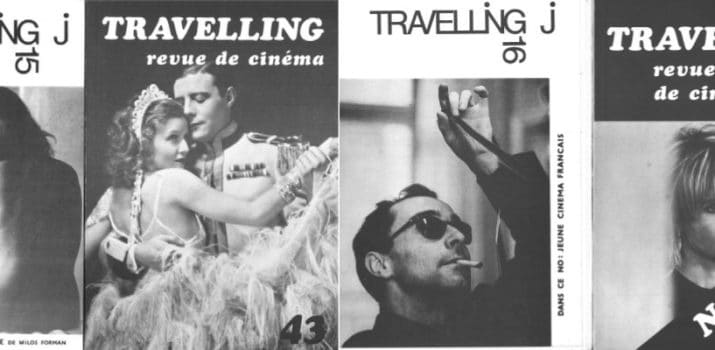“Travelling” on the Scriptorium website


Lausanne’s film magazine is now available online!
“Why “TRAVELLING J”? Because it didn’t exist. While there are several film magazines in Switzerland, none are written in French specifically for young people.
As a popular art form, cinema touches every stratum of society. But film culture?
“Travelling J”: the young, objective guide you need!
[…] In this day and age, we can no longer afford to ignore cinema.
[…] And we want to prove that cinema is not Fernandel and Darry Cowl, but Bergman and Welles, for example. You’ll also read reports on Swiss cinema.”
(“Zoom”, Travelling Jeunesse,no. 1, October 1963, p. 2)
The digitization of Lausanne’s magazine Travelling (1963-1980) is part of BCU Lausanne’s program to provide online access to the historical content of the main periodicals published in the canton of Vaud. It is also in line with the BCU Lausanne’s mission to preserve and enhance its heritage holdings. This project has benefited from the invaluable support of the Cinémathèque suisse.
Travelling magazine is an important source for the study of cinema and its critical reception. It includes columns and feature articles on a variety of themes. It covers filmmakers, festivals and national cinematograhies. The magazine also features interviews and film reviews, with a special focus on Swiss cinema (films, events, state of play and issues). It appears between 2 and 5 times a year, and has had various cover titles over the course of its existence: Travelling Jeunesse, Travelling J., Travelling J Cinéma – TV, Travelling J, Travelling, Travelling. Revue de cinéma and finally, Travelling. Swiss Film Archive .
Founded in 1963 by Marcel Leiser of Lausanne, who ran the company until 1975, it is published by the Groupe d’Étude du Film (GEF), a non-profit association created for this sole purpose and staffed by a team of volunteers. Marcel Leiser was only 18 years old at the time, and considered himself to be seriously infected by the cinephilia virus: “Fascinated by this audiovisual medium with such magical emotions, it was my duty, like others, and like a little cultural missionary, to preach the good word of this seventh art”.(Roland Cosandey, Un dossier Marcel Leiser, “Documents de cinéma”, Cinémathèque suisse).
Impressed by the long, slow camera movements in Nuit et Brouillard and L’année dernière à Marienbad, he named the magazine “Travelling”, in homage to Alain Resnais. Because of his many editorial contributions, he often used pseudonyms (Lecram Resiel, Alexis Duval, Aloïs Duval, etc.). He went on to become a journalist and filmmaker, most notably responsible for the cinema section of La Nouvelle Revue de Lausanne from 1966 to 1975.
For a long time, this cinema fanzine was produced on a small-scale by young enthusiasts, and now brings together a team of regular and occasional editors, including future filmmakers Marcel Schüpbach and Jean-François Amiguet, future head of documentaries at TSI Luisella Realini, François Albera, future chair of cinema at the University of Lausanne, and Hervé Dumont, future director of the Cinémathèque suisse.
As the issues progress, the tone becomes more committed:
“The time when we could limit our ambitions to the role of a simple newsletter was over. for young cinephiles is over. “Travelling j” must become an organ of combat. […] Dogmatism has no place in our pages. ” (Marcel Leiser and François Pasche, Travelling J,no. 11, Winter 1966, pp. 16-17).
Or, on the subject of Swiss cinema:
“[…] The public doesn’t follow, traumatized by radio and television, soap operas and game shows (in the distressing style of” interneiges “), weeklies with a primary vocation as advertising media, and the cinema-spectacle (a bad spectacle, of course), all of which goes hand in hand with a progressive movement towards Americanization, limited to the negative aspects of the U.S.A.”. (Marcel Leiser and François Pasche, Travelling J,no 11, Winter 1966, pp. 12-13).
In autumn 1975, after its triple monographic issue (44/45/46), the magazine was taken up and continued in a new perspective by the Cinémathèque suisse, thanks to the mediation of André Chevailler, a Cinémathèque collaborator. It ceased publication in 1980.
As a teaser for our cinephile audience to discover Travelling, here’s a review of Jean-Luc Godard’s 1964 film Une femme mariée:
“Apart from the fact that it’s difficult to be impartial about Godard’s films (I, for one, would gladly apologize for them), UNE FEMME MARIÉE is an interesting film that Godardomanes and Godardophiles owe it to themselves to see and then discuss, if they’re up to it. […] Mise en scène: an exploration of new forms of language, an ethnologist’s view of a world in perpetual contestation, from which a new morality seems to emerge”. (François Pasche, Travelling J,no. 8, Spring 1965, pp. 75-76).
Links :